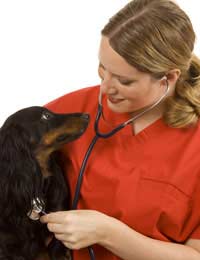Eye Conditions

Many breeds of dogs suffer from inherited eye conditions in many cases causing blindness and even considerable pain. It is heartbreaking for an owner to watch their pet suffer and for the dog to lose quality of life, often at a young age. The best way to avoid this is to always buy your pup from a reputable breeder who test their dogs and refuse to breed from those which exhibit eye conditions, thus ensuring that their lines are free of eye problems. If less ethical breeders get no support (i.e. no one buys their poor quality puppies), they are more inclined to follow recommendations and perform proper screening tests and only breed from healthy stock, regardless of looks.
The Effects of Eye Problems…
While it is believed that many dogs learn to cope with their loss of sight, many dogs also become depressed and fearful, unable to cope with their new, dark world. Dogs will fall off the pavement, walk into walls and scratch and hurt themselves (including noses becoming bald where they keep bumping into things). Dogs can also display behavioural changes, such as drinking excessively and losing weight. They cannot be trusted off the lead anymore and may develop aggression towards other dogs. It is important to seek professional advice if your dog seems to suffering and unable to cope with their eye problems – to understand how to help them cope.Types of Eye Conditions
There are a huge range of eye conditions, ranging from small distortions of the retina and deeper eye structures (egg. collie eye anomaly) to severe pain and blindness, such as persistent papillary membrane (PPM) and persistent hyperplastic primary vitreous (PHPV). The British Veterinary Association (BVA) and the Kennel Club (KC) together with the International Sheep Dog Society, have developed screening programmes for 11 eye conditions, which can affect over 50 dog breeds. This way, if breeders are scrupulous and test their dogs, no dog with a genetic eye condition will be used for breeding, thus reducing the overall incidence in the breed over several generations. This does rely on the breeders’ honesty and ethics and unfortunately, there are still many unethical, irresponsible breeders out there. If in doubt, ask.The eleven conditions which can be tested for include:
- Central progressive retinal atrophy
- Collie eye anomaly
- Congenital hereditary cataract
- Generalised progressive retinal atrophy
- Goniodysgenesis/primary glaucoma
- Hereditary cataract
- Multifocal retinal dusplasia
- Persistent hyperplastic primary vitreous
- Persistent papillary membrane
- Primary lens luxation
- Total retinal dysplasia
Breeds which are prone to eye conditions include collie breeds, spaniel breeds, retriever breeds, poodles (all three sizes), Miniature Schnauzer, Welsh Corgi, Siberian Husky, Staffordshire Bull Terrier and Sealyham Terrier, among others (this is not an exhaustive list). Many congenital hereditary conditions, such as congenital hereditary cataract, multifocal retinal dysplasia and persistent hyperplastic primary vitreous, can be picked up in pups and thus puppies can be tested between the ages of 6 and 12 weeks. For more information, contact the Kennel Club or the British Veterinary Association.


Re: Find a Ringcraft Club
Hi, I’m looking for ringcraft classes near Dundee please.. Thanks.
Re: Find a Ringcraft Club
Hi, I’m looking for ringcraft classes near Dundee please..
Re: Find a Ringcraft Club
looking for ringcraft classes in Shropshire/Wales Border
Re: Find a Ringcraft Club
Hello, I'm looking for a local ring craft in Hertfordshire for our 8 month old Labrador puppy.
Re: When to Start Training to Show?
Is there a centre near swansea
Re: Find a Ringcraft Club
Correction my whippet is 10 months old.
Re: Find a Ringcraft Club
I am looking for a ringcraft classes near to great Barr Birmingham. I have a 20 month old kc whippet and I would like for her to attend…
Re: Find a Ringcraft Club
Looking for local ring craft classes Redditch Worcs area 2 chihuahua
Re: Find a Ringcraft Club
Hi, I'm looking for a ring craft class around Bacup in Lancashire?
Re: When to Start Training to Show?
Please can any tell me where I can find a ring craft class near Beverly East Yorkshire also does anyone know of any local…